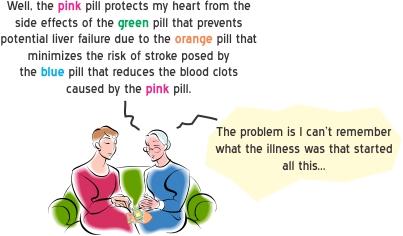What is Causing my Health Problems and Why has my Medical Doctor been Unable to Help Me?
Here’s a disturbing fact: 99% of health problems are chronic (continuing or recurring) and medical doctors admit to not being able to cure almost all of them. To me, this seems like the huge debate we should be having as a nation about health care, not just “who is going to pay for it.”
The information below is from the CDC website:
- About 133 million Americans—nearly 1 in 2 adults—live with at least one chronic illness.
- More than 75% of health care costs are due to chronic conditions.
- Approximately one-fourth of persons living with a chronic illness experience significant limitations in daily activities.
- The percentage of U.S. children and adolescents with a chronic health condition has increased from 1.8% in the 1960s to more than 7% in 2004.
Although chronic diseases are more common among older adults, they affect people of all ages and are now recognized as a leading health concern of the nation.
So what’s the answer to this dilemma? I go with the solution that we have used to solve thousands and thousands of chronic cases here at the clinic. Read below to get a better understanding of how we go about doing this!
Dr. Melodie Billiot
A chronic health problem is one that happens continuously or recurs frequently, such as diabetes, high blood pressure, menstrual problems, joint or muscle pain, digestive problems, fatigue, depression, etc. Medical doctors manage these types of problems, usually with drugs. There is little effort spent on discovering the cause of the problem or permanently resolving it.
You could define a “chronic” health problem as “a problem that medical doctors don’t know how to fix.” This is why the problem continues on even with medical treatment.
Medical doctors are “allopathic physicians.” Allopathic means, “Treating the system that causes the symptom.” For example if a bone is broken, the system causing the symptoms of swelling and pain is the bone itself. An allopathic doctor will treat the bone, with good result. As long as the problem is a medical emergency the allopathic model works well.
Chronic health problems are caused by the body’s normal healing ability being interrupted. This isn’t general, where the body overall “can’t heal” but in one or more specific areas (such as the heart or kidneys or ovaries or small intestine). There are specific causes for the problem in each area, such as, the kidneys can’t heal because of viral stress, or the ovaries can’t recover because of fungal stress. When this healing interruption occurs, the body compensates: it adapts to the stress of the unresolvable problem to keep itself functioning. If the body is successful with this, the person will not experience a symptom at all. Over time with the body still not able to heal, the stress mounts up. The body compensates repeatedly and the person still experiences no symptoms or minor symptoms. When the stress finally becomes overwhelming and the body fails to compensate, it is forced to have a major symptom. This can occur soon after the problem starts or many years later. This major symptom occurs at the end of a series of compensations by the body, and the specific symptom generally has little to do with the original problem.
An allopathic doctor will treat the symptom created by the body at the end of this series of compensations. Because this symptom has little to do with the original cause of the problem and because only the body can restore its own ability to heal, the treatment will only suppress the symptom temporarily. This requires continuous treatment to control the symptom, usually with drugs. Meanwhile, nothing has been done about the actual cause of the stress, which becomes worse over time.
Here’s an example:
Your car’s fuel injection system fails and it won’t start. You can’t fix the problem, so you COMPENSATE by calling a friend for a ride to work. Next day, the car still won’t start so you ride the bus (a second compensation). This continues on for a long time, each day you figure out another way you can get to work, compensating for the problem (fuel injectors) that you can’t solve. One day all your efforts fail, you can’t get to work and you lose your job. This is the major symptom, and in our analogy would be the first time the person found out that they had a health problem. If the person goes to an allopathic doctor for help, the doctor would give them a drug that gets them another job… “Treating the system that causes the symptom”. Of course, without a car the person loses that job right away and so needs to continue to take the drug each day to get another job. This would continue indefinitely, because nothing is being done about the fuel injection system to get the car back running.
The Solution
The solution to chronic health conditions is to identify the specific areas in the body that are unable to heal, and assist the body to heal them itself. Attempts at invasive treatment (i.e. medical drugs or surgery) are ineffective here, as proven by the simple fact that chronic health problems don’t get well when treated this way.
Alternative Health Atlanta uses a new approach to health care called EVECTICSSM that assists the body in healing itself, while allowing the body to “be its own doctor” and decide for itself what needs to be done and in what sequence.
What experiences have you had with chronic health conditions? Let me know…
Blog Subscription
Get Great Information about your Health
- Weekly blog posts with vital tips and warnings
- Interesting “pass it along” health facts
- Cutting edge natural healing techniques and advice



